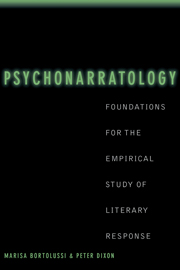Book contents
5 - Characters and Characterization
Published online by Cambridge University Press: 28 July 2009
Summary
After plot, the most intuitively important aspect of a story concerns the characters. For example, in some simple stories, characters create the plot: The villain creates a problem that the hero must overcome. In some complex, literary narratives, characterization would seem to be an overriding motivation of the implied author, with the events of the narrative merely serving to provide information about the characters. Not surprisingly, then, character and characterization have been a productive area of scholarship in narratology and literary studies. Important work has also been done in linguistics and discourse processing. Our view is that work in personality and social psychology is also directly relevant to understanding character in narrative, although the connection has not always been made in discourse processing research. In this chapter, we review some of the work in these disciplines. We then discuss some categories of features that are relevant to character in narrative and provide a general framework for how these might be used by readers. Finally, we provide some evidence on the use of characterization features by readers.
Theories of Literary Character
Theories of literary character can be situated on a continuum ranging from traditional to contemporary and more radical models. (For an excellent coverage of these theories, see Margolin, 1989, 1990b). The central issue in this debate has been the relationship between literary character and real people. Traditional theories treated literary characters uncritically as analogues of real people.
- Type
- Chapter
- Information
- PsychonarratologyFoundations for the Empirical Study of Literary Response, pp. 133 - 165Publisher: Cambridge University PressPrint publication year: 2002



